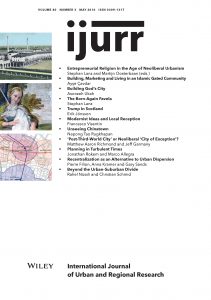Since the 1980s, the metropolitan spaces of Brazil have seen a significant upsurge of the Christian Pentecostal movement, which today dominates the religious landscape of the favelas. In Rio de Janeiro, the rise of Pentecostalism coincided with the establishment of drug gangs as actors controlling favela territories. Based on an ethnographic field study conducted in a favela complex in the city’s Zona Norte, this article examines the role and significance of the Pentecostal churches in Rio’s favelas, both in everyday urban life and in the ways these areas are governed. One of my focal points of analysis is the increasing entanglement of actors in the drug industry and church actors. The article posits that the Pentecostal churches’ role and significance, their institutional shape and their followers’ practices are inextricably intertwined with the favela’s social, spatial and political structural patterns. It shows the ways in which the evolving Pentecostal movement has permeated all aspects of the favela’s informal way of urban life and government and has produced a new urban religious configuration in which the Pentecostal movement and the favela are intertwined and transform each other.
Details
Written by:
Stephan Lanz
Digital Object Identifier (DOI)
10.1111/1468-2427.12362
About DOI
Read full article as HTML
See the references for this article

